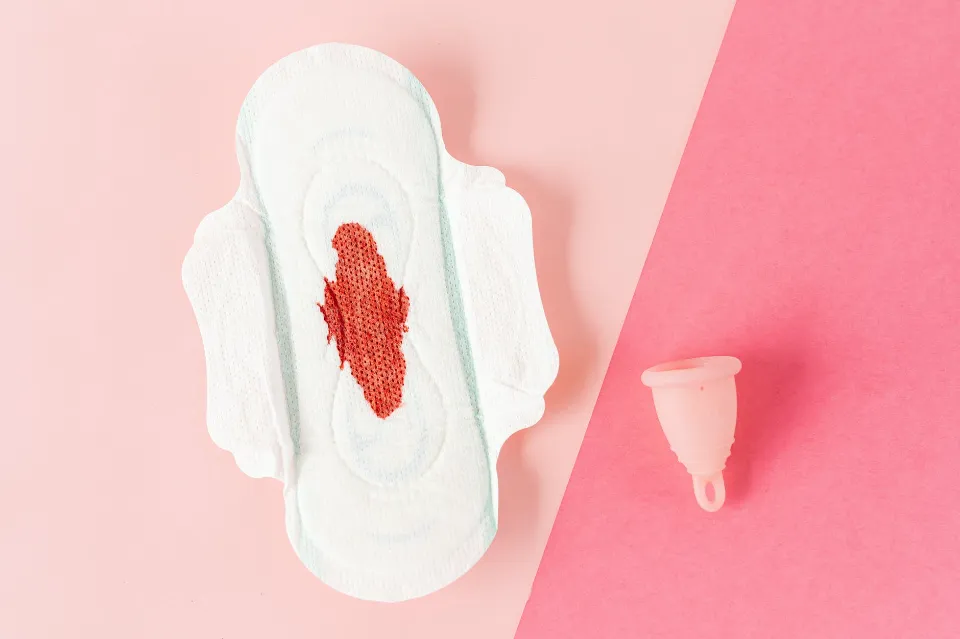
Stringy Period Blood: What Does It Mean & Is It Normal?
The majority of the time, anything you observe on your pad or experience during your period is entirely normal. The range of “normal” for period blood color and consistency is very wide. Let’s discuss the nature of period blood and the reasons it can occasionally be stringy.
Stringy menstrual blood is typically just a sign that the blood flow is at its heaviest for that particular phase of your cycle.
Simply inhale deeply, then unwind. At some point in their lives, most women experience having stringy period blood, which is actually completely normal.
What Does Stringy Period Blood Mean?

Stringy period blood is quite common for any period and shouldn’t be a major cause for alarm, as we’ve already mentioned. But why is the blood from your period stringy in the first place? Usually, it’s just blood that has been sitting in your uterus for a short period of time before leaving your body. Additionally, as the blood remains still in your uterus, it oxidizes. Additionally, this explains why the color of stringy period blood is typically a dark red or brown.
Read More: How To Tell Your Mom You Got Your First Period
If we stop to consider it, what else does blood do when it isn’t flowing? Therefore, to put it another way: Stringy period blood is nothing more than a type of blood clot (which is also very typical for your period).
What Determines the Consistency of Your Period?
Most of the time, stringy period blood is nothing to worry about. In most cases, a “stringy” or gel-like consistency is just a blood clot leaving your uterus. Small blood clots that are roughly the size of a quarter are common.
Remember that your “period” refers to the first days of each menstrual cycle, when the lining of your uterus is discarded by your body. The blood from a period is a combination of blood, vaginal fluid, and this discarded uterine lining.
The heaviest days of bleeding usually occur the first day or two of your period. Additionally, on these days, you’ll probably notice that the blood that your body is releasing has a range of consistencies.
Stringy Period Blood
With the uterine lining that your body is shedding, long, sticky strands of blood with a fluid consistency can become extremely concentrated. Typically dark or bright red, this stringy period blood.

Clumpy Period Blood
You might start to experience jelly-like blood or blood that is clumped up into large chunks as your period progresses. Blood clots that are moving through your body frequently cause this. In any phase of your period, this is normal.
However, as your flow starts to slow down in the later days of your period, you might be more likely to notice this. These clots can be brown, dark red, or bright red in color.
Watery Period Blood

The blood from your period may seem thin and watery toward the end of your cycle. Additionally, as the blood oxidizes, the color may get darker.
Fresh blood from your uterus may be the source of bright red, watery period blood. This could be a sign of an injury or miscarriage.
If there’s a chance that you might be pregnant and you notice that your uterus is leaking bright red, watery blood, get medical help right away.
Consult your primary care physician or gynecologist if you frequently pass sizable blood clots during your period.
How the Blood Changes During Your Period
Throughout your cycle, whether it be daily, monthly, or even over the course of your lifetime, it is normal for your blood to change color.
The color can change throughout a period in terms of brightness, darkness, and hue, ranging from bright reds to dark browns. Flow and the age of the period blood will determine this. These frequently fluctuate throughout your period, for example. on day one or two, your flow will be faster, the blood will be newer and therefore is likely to be bright red. Your period blood will likely be darker in color as it progresses because your flow may slow down or your blood may be older.
It is always advisable to consult your doctor if you notice a color that isn’t what you’d normally expect, especially if you’re also exhibiting other unusual symptoms for you.

When to See Your Doctor
The majority of the time, your period blood’s consistency is perfectly normal, especially if the change is slight and only occurs during your period. However, if you observe a change in the consistency of your period blood that appears to be semi-permanent, it may indicate an underlying problem.
In Summary
Even if you’ve never had stringy period blood before, it’s just a regular aspect of any period! Therefore, if stringy bits appear out of nowhere during your period, don’t become alarmed. However, it’s best to speak with your GP if you notice any significant variations in your monthly bleed.
FAQs
Why is My Period Blood Stretchy and Slimy?
Because they combine tissue, coagulated blood (blood that is semi-solid, partially clotted), and blood that has not yet clotted, the blood clots in your menstrual flow may seem especially slimy and almost jello-like. It is typical for people on periods to experience an increase in clots during the first few days of their cycle.
Why is My Blood Thick and Stringy?
Your blood could become too thick if a disproportion between the proteins and cells necessary for blood and blood clotting arises. Hypercoagulability is the term for this. Extra blood cells in circulation are one such factor that can contribute to thick blood.
Does Slimy Period Mean Pregnancy?
Early pregnancy may manifest as changes in cervical mucus. Your cervical mucus thickens or dries up after ovulation, and then you eventually start your period. Although you might still produce some cervical mucus if you became pregnant at ovulation. For some women, this may be a sign that they may have become pregnant. (Read More: When Does Ovulation Weight Go Away)





Average Rating